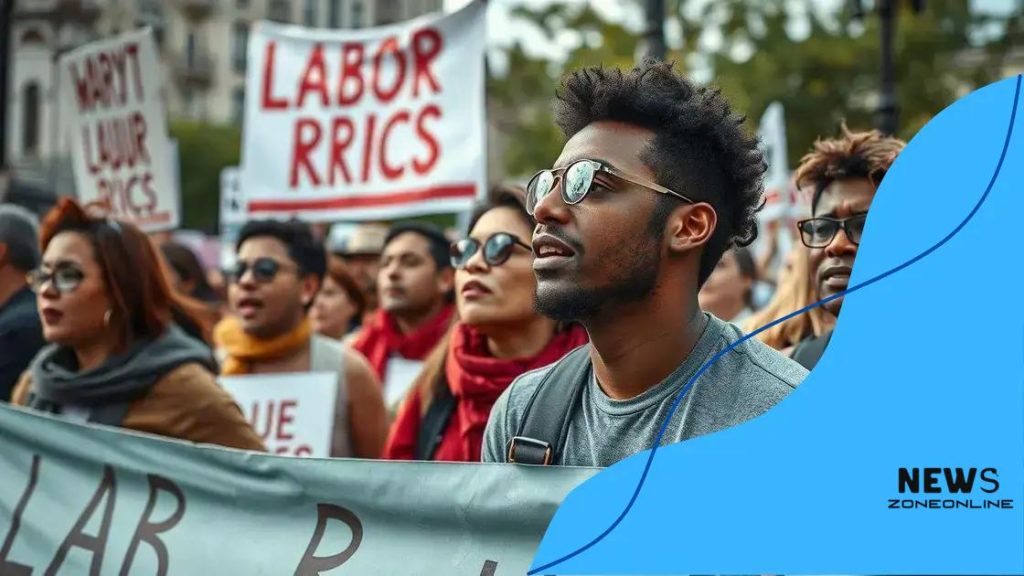Labor rights documentary exposure: uncovering hidden truths

Labor rights documentary exposure highlights the struggles and stories of workers, raising public awareness and inspiring advocacy for better labor laws and conditions.
Labor rights documentary exposure opens our eyes to the often-overlooked realities of the workforce. Have you ever wondered how documentary films can shine a light on the struggles of workers? Let’s dive into this critical topic.
Understanding labor rights
Understanding labor rights is essential for both workers and employers. These rights help to ensure fair treatment, safe working conditions, and just compensation. Knowing your rights can empower you and protect your interests in the workplace.
What are labor rights?
Labor rights, often referred to as workers’ rights, encompass a range of legal and human rights related to the workplace. They primarily aim to secure equitable treatment and enhance job security for employees. Examples include the right to fair wages, the right to organize and join unions, and the right to a safe workplace.
Key components of labor rights
- Right to fair wages: Employees must receive reasonable compensation for their work.
- Right to safe working conditions: Employers are required to maintain a healthy and hazard-free environment.
- Right to organize: Workers can join unions to collectively bargain for better terms.
- Right to non-discrimination: Everyone should be treated equally, regardless of race, gender, or religion.
A comprehensive understanding of these rights helps promote a more equitable workplace. It also empowers workers to advocate for themselves and report any violations. Workers who are aware of their rights are more likely to take action when faced with unfair practices.
Additionally, labor rights play a crucial role in shaping the relationship between employees and employers. When both parties understand and respect these rights, it fosters a healthier work atmosphere. This can lead to higher job satisfaction, reduced turnover, and increased productivity.
Key documentaries on labor issues
Key documentaries on labor issues shine a light on the challenges faced by workers across various industries. These films often tell powerful stories that can inspire change and inform the public about important labor rights.
Notable documentaries worth watching
Several notable documentaries provide insight into labor issues and the effects of poor working conditions. They offer diverse perspectives and showcase the struggles of workers. Here are a few essential ones to consider:
- “The Fight for $15”: This documentary explores the movement for minimum wage increases and the fight for fair pay, revealing the personal stories behind the movement.
- “American Factory”: This film examines the clash of cultures when a Chinese billionaire opens a factory in Ohio, highlighting labor practices and tensions.
- “Steel Town”: Focused on steelworkers in Pennsylvania, this documentary illustrates the impact of globalization and factory closings on local communities.
- “The True Cost”: This film dives into the fashion industry, exposing labor exploitation and environmental costs of fashion production.
These documentaries have touched many people’s hearts and minds, encouraging discussions about labor rights. They are not just films; they are catalysts for change, inviting viewers to think critically about the conditions of workers globally.
By watching these powerful documentaries, individuals can gain a greater understanding of the complexities surrounding labor rights. The stories shared in these films often motivate audiences to engage in advocacy for better working conditions.
Impact of documentary exposure on public awareness

The impact of documentary exposure on public awareness is significant in shaping perceptions about labor rights. Documentaries serve as powerful tools to educate the public and spark conversations about critical issues. When people watch these films, they often gain a new perspective on the struggles faced by workers.
How documentaries influence perceptions
Many documentaries highlight real-life stories that resonate with viewers, making abstract issues feel personal. This emotional connection can inspire action, prompting viewers to advocate for labor rights and support relevant movements.
Increased engagement and activism
Public awareness tends to increase after audiences view documentaries. People become more informed about labor conditions in their community and abroad. This newfound knowledge can lead to:
- Increased participation: Viewers may join local advocacy groups or support campaigns aimed at improving worker rights.
- Demand for change: Documentaries can encourage the public to pressure policymakers to improve labor laws.
- Widespread discussions: These films often become conversation starters, leading to broader discussions about justice and fairness in the workplace.
Furthermore, social media plays a crucial role in amplifying the impact of these documentaries. People share their thoughts online, promoting awareness among their networks. As discussions grow, more viewers get involved, amplifying the message of labor rights.
Each documentary not only informs but challenges viewers to consider their roles in advocating for justice. By raising awareness, documentaries can contribute to real-world changes that improve labor conditions for many workers.
How documentaries influence labor laws
Documentaries play a crucial role in shaping public opinion and influencing labor laws. By highlighting the stories of workers, these films can bring attention to injustices and motivate societal change. When people see the realities faced by workers, they often demand reforms.
Raising awareness
One major way documentaries influence labor laws is by raising awareness. Documentaries can illuminate issues such as unsafe working conditions, wage theft, and discrimination. When audiences witness these struggles, they often feel compelled to take action.
Driving legislative change
Through the compelling narratives presented in documentaries, viewers may become more politically active. This increased engagement can pressure lawmakers to address labor issues. For instance, documentaries can:
- Highlight legislation gaps: They can expose where current laws fall short in protecting worker rights.
- Showcase successful reforms: Documentaries can illustrate successful changes in labor laws, inspiring similar efforts in other areas.
- Mobilize public support: These films often encourage viewers to advocate for specific legislation, rallying community support.
As public pressure mounts, lawmakers may introduce new policies or amend existing laws to protect labor rights. Documentaries serve as a conduit for change, initiating important conversations about the need for fairer labor standards.
Additionally, the impact of documentaries extends beyond just raising awareness. They ignite dialogues within communities and among policymakers. This fosters a culture where labor rights are prioritized and discussed more openly, leading to a more informed citizenry.
Stories from workers featured in documentaries
Stories from workers featured in documentaries offer powerful insights into the real-life struggles and triumphs of individuals in the workforce. These personal narratives shed light on various labor issues, making the challenges faced by workers relatable and compelling.
Impactful personal stories
Documentaries often focus on individual workers, allowing their voices to be heard. Through these stories, viewers can connect emotionally with the subjects. This connection makes the abstract issues of labor rights much more tangible. Each narrative highlights different aspects of working life, from unfair wages to unsafe conditions.
Diverse experiences
The experiences shared in these documentaries can vary widely, showcasing:
- Overcoming obstacles: Many workers share stories of how they have faced and conquered unfair treatment in their jobs.
- Community solidarity: Some documentaries highlight the power of workers coming together to advocate for their rights and push for changes.
- Personal sacrifices: These stories often reveal how individuals and families can suffer due to unjust policies affecting working conditions.
Through these stories, documentaries become more than just films; they are a platform for advocacy. The narratives compel both viewers and decision-makers to consider the consequences of current labor practices.
Moreover, the visibility these stories receive can lead to broader discussions about labor rights in society. When individuals share their journeys, it inspires others to speak out about their own experiences, creating a ripple effect. These documentaries transform personal experiences into a collective narrative that can influence public perceptions and policy.
In summary, documentaries about labor rights play a pivotal role in shaping public awareness and advocating for change. By sharing personal stories from workers, these films highlight the importance of understanding labor issues. They not only educate viewers but also inspire action and dialogue. The impact of these stories can lead to greater advocacy for improved labor laws and practices. As we continue to engage with these powerful narratives, we can work towards creating a fairer and more just society for all workers.
FAQ – Frequently Asked Questions about Labor Rights Documentaries
How do labor rights documentaries impact public awareness?
Labor rights documentaries raise awareness by showcasing real stories of workers, highlighting injustices, and inspiring viewers to advocate for change.
What types of stories are featured in these documentaries?
These documentaries often feature personal stories of struggles, triumphs, and the collective efforts of workers advocating for their rights.
Can watching these documentaries lead to real changes in labor laws?
Yes, they can pressure lawmakers to address labor issues by mobilizing public support and increasing awareness of injustices.
What role do worker narratives play in these films?
Worker narratives personalize labor issues, making them relatable and compelling, which helps drive conversations and inspire activism.





